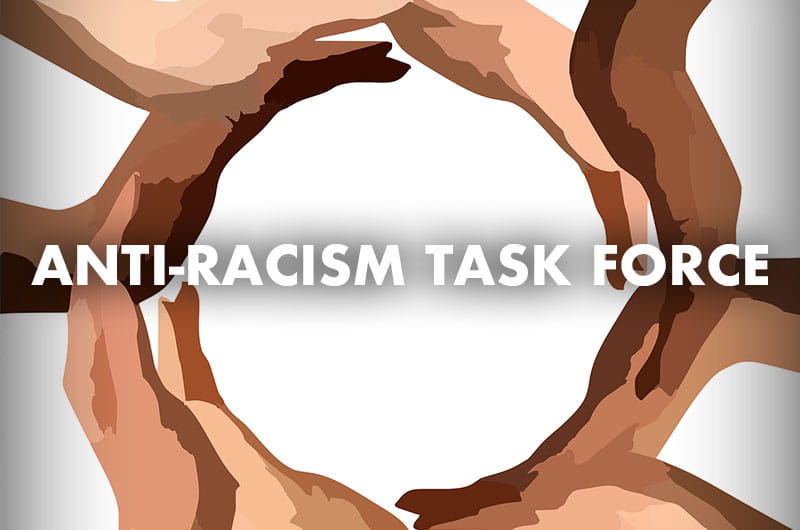An Update on the Anti-Racism Task Force and Drexel's Diversity, Equity and Inclusion (DEI) Efforts

Message Outline:
- Overview from the Task Force Chairs
- Seeking Input from Graduate & Doctoral Students
- Sharpening the Focus on Business Practices
- Identifying Gaps & Needs in Policies and Procedures
- Engaging the Community
- Monthly Series: Developing Anti-Racist Pedagogies
- DEI Educational Programs
- Contact Information
Dear Members of the Drexel Community,
Since early August, the 11 committees of the Anti-Racism Task Force (ARTF) have been meeting regularly and working to set priorities, research issues, hear from members of the University community, and begin to formulate recommendations. We are grateful for the work of the Task Force members, who volunteer their time and talent to help bring about positive institutional change through careful, thoughtful, and thorough review, analysis, and dialogue.
We have also been pleased that so many of you have participated in the process, reaching out to the Task Force either by email (anti-racism@drexel.edu) or by meeting with the co-chairs in person to share your opinions and concerns. As this work continues, we encourage input from everyone with thoughts on how to create a more inclusive environment with anti-racist structures and practices.
Below are some recent updates and developments from the subcommittees and from the Office of Equality and Diversity.
Seeking Input from Graduate & Doctoral Students
The ARTF's Graduate & Doctoral Student Life Subcommittee has invited the Drexel graduate student and research community to use this form (anonymously, if you wish) to raise issues, report incidents, or address questions directly to the committee to help inform their work.
Sharpening the Focus on Business Practices
The ARTF's Business Practices Subcommittee has determined its four key focus areas, with smaller working groups drafting recommendations for each area. The four areas are: 1) endowment and financing strategies to assist community businesses; 2) increasing direct spend with diverse and local businesses; 3) Drexel contracting processes and current practices; and 4) collaboration and partnerships with community organizations.
Identifying Gaps & Needs in Policies and Procedures
The ARTF's Policies and Procedures Subcommittee has met with stakeholders from across the University, including the offices of Equality and Diversity, Research and Innovation, Student Success, Faculty Affairs, Admissions and Human Resources. The subcommittee's work has been focused on defining key terms of University policies; assessing the current policy review process; identifying key policy gaps and needs; determining needs and recommendations around communications within the University; and assessing the need and feasibility for a potential external review.
Engaging the Community
The ARTF's Community Engagement Subcommittee divided its team into sub-groups to focus on three main aspects of community engagement: 1) internal Drexel policies and procedures (working with the Policies and Procedures Subcommittee); 2) external impact and historical implications of Drexel's community engagement practices; and 3) best practices for predominantly white institutions to engage local communities. To best inform its recommendations, the subcommittee is researching existing, validated frameworks on community engagement and anti-racist practices. The subcommittee has also worked with Senior Vice Provost for University and Community Partnerships Lucy Kerman and Assistant Vice President of External Affairs Karen Lewis to identify community stakeholders whose perspective is important to this work and discussed a strategy to gather community input.
Monthly Series: Developing Anti-Racist Pedagogies
Join Drexel University's Teaching and Learning Center for a new monthly short reading discussion series examining the intersection of race, identity, teaching and learning. Each month, participants will be provided with a short article, chapter or excerpt to read. Through semi-structured and small group discussion, participants will explore the concepts in the readings and reflect on ways they may be implemented within their teaching. These materials will address a number of topics such as how social identities impact classroom dynamics, how to practice culturally relevant pedagogies, how to create inclusive classroom environments, and how to promote honest and productive discussion. This series is co-sponsored by the Office of Equality and Diversity. Register at this link.
DEI Educational Programs
The Office of Equality and Diversity offers a variety of diversity, equity and inclusion trainings to the Drexel community (students, professional staff, faculty and neighbors) and will work with you to develop a special training or other programming/events that meet your specific needs. Visit the OED website to see the current offerings and to schedule a workshop or training.
As always, we are here to support you, and we know that communication must be a two-way street. Please use the contact information provided at the end of this message to get in touch with us, provide feedback and suggestions, make a report, or find counseling resources.
Respectfully,
Kim Gholston, Subir Sahu, Aroutis Foster, Lucy Kerman
Co-Chairs, Anti-Racism Task Force
CONTACT US
The Anti-Racism Task Force is asking for your input as its members begin the process of formulating recommendations. If you have questions, concerns, requests or ideas, please email anti-racism@drexel.edu to make an appointment to meet with the co-chairs of the Anti-Racism Task Force. Office Hours are Wednesdays from 3-4 p.m.
To report discrimination, harassment and other bias incidents, email the Office of Equality and Diversity at oed@drexel.edu or call 215.895.1405.
Experiencing or witnessing racial injustice can have a direct impact on mental well-being.
To talk to someone from the Student Counseling Center, email counseling@drexel.edu.
Drexel is committed to providing care for our faculty and professional staff coping with discrimination, hate and violence. To talk to someone from the Employee Assistance Program, call 1.888.628.4824.